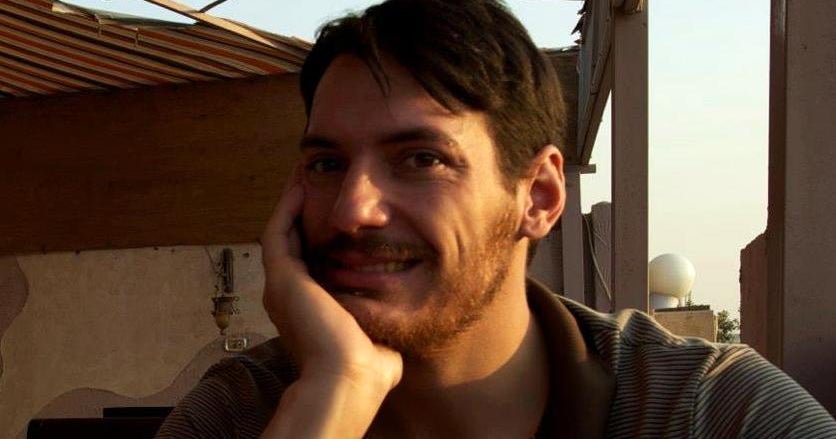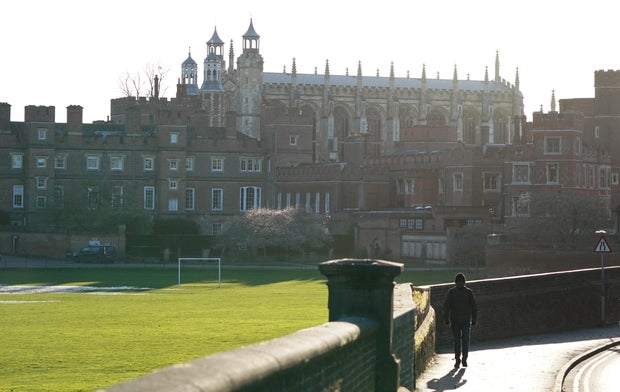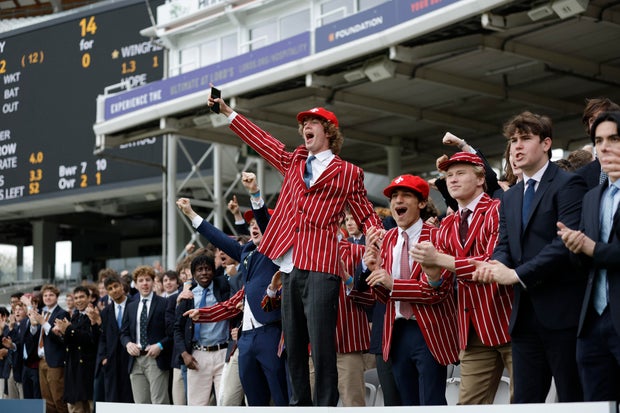CBS News
New students at Eton, the poshest of Britain’s elite private schools, will not be allowed smartphones

London — Eton College, arguably the poshest, most elite boarding school in Britain, is banning incoming students from having smartphones.
Eton, located near the royal palace in Windsor, just west of London, is renowned for its academic excellence. Notable alumni include Princes William and Harry, as well as novelist George Orwell, James Bond creator Ian Fleming and a long list of former prime ministers, including recent leaders Boris Johnson and David Cameron.
The ban, which is due to take effect in September, comes after the U.K. government issued guidance backing school principals who decide to ban the use of cellphones during the school day in an effort to minimize disruption and improve classroom behavior.
Andrew Matthews/PA Images/Getty
Parents of first-year students at Eton — where tuition exceeds $60,000 per year — were informed of the changes in a letter, which said that incoming 13-year-old boarders should have their smart devices taken home after their SIM cards are transferred to offline Nokia phones provided by the school, which can only make calls and send simple text messages.
Eton’s previous rules on smartphones required first-year students to hand over their devices overnight.
“Eton routinely reviews our mobile phone and devices policy to balance the benefits and challenges that technology brings to schools,” a spokesperson for the school told CBS News on Tuesday, adding that those joining in Year 9, essentially the equivalent of freshman year in high school for American students, “will receive a ‘brick’ phone for use outside the school day, as well as a school-issued iPad to support academic study.”
Tom Jenkins/Getty
The spokesperson added that “age-appropriate controls remain in place for other year groups.”
According to Ofcom, the U.K. government’s communications regulator, 97% of children have their own cellphone by the age of 12.
In the U.S., a recent survey published by Common Sense Media found around 91% of children own a smartphone by the age of 14. Similar policies on smartphones have been introduced in schools around the U.S., varying from complete bans to restricted use in specific times or areas. The 2021-2022 school year saw about 76% of schools prohibit the non-academic use of smartphones, according to the U.S. Department of Education.
Bans have been met with mixed reactions, as some argue these personal devices can also have curricular benefits, such as allowing students to engage in live surveys or access content and data during lessons. Some parents have also raised concerns that phone bans could prevent their children from reaching them during potential emergencies.
CBS News
Biden’s top hostage envoy Roger Carstens in Syria to ask for help in finding Austin Tice

Roger Carstens, the Biden administration’s top official for freeing Americans held overseas, on Friday arrived in Damascus, Syria, for a high-risk mission: making the first known face-to-face contact with the caretaker government and asking for help finding missing American journalist Austin Tice.
Tice was kidnapped in Syria 12 years ago during the civil war and brutal reign of now-deposed Syrian dictator Bashar al-Assad. For years, U.S. officials have said they do not know with certainty whether Tice is still alive, where he is being held or by whom.
The State Department’s top diplomat for the Middle East, Barbara Leaf, assistant secretary of state for Near Eastern Affairs, accompanied Carstens to Damascus as a gesture of broader outreach to Hay’at Tahrir al-Sham, known as HTS, the rebel group that recently overthrew Assad’s regime and is emerging as a leading power.
Near East Senior Adviser Daniel Rubinstein was also with the delegation. They are the first American diplomats to visit Damascus in over a decade, according to a State Department spokesperson.
They plan to meet with HTS representatives to discuss transition principles endorsed by the U.S. and regional partners in Aqaba, Jordan, the spokesperson said. Secretary of State Antony Blinken traveled to Aqaba last week to meet with Middle East leaders and discuss the situation in Syria.
While finding and freeing Tice and other American citizens who disappeared under the Assad regime is the ultimate goal, U.S. officials are downplaying expectations of a breakthrough on this trip. Multiple sources told CBS News that Carstens and Leaf’s intent is to convey U.S. interests to senior HTS leaders, and learn anything they can about Tice.
Rubinstein will lead the U.S. diplomacy in Syria, engaging directly with the Syrian people and key parties in Syria, the State Department spokesperson added.
Diplomatic outreach to HTS comes in a volatile, war-torn region at an uncertain moment. Two sources even compared the potential danger to the expeditionary diplomacy practiced by the late U.S. Ambassador Christopher Stevens, who led outreach to rebels in Benghazi, Libya, in 2012 and was killed in a terrorist attack on a U.S. diplomatic compound and intelligence post.
U.S. special operations forces known as JSOC provided security for the delegation as they traveled by vehicle across the Jordanian border and on the road to Damascus. The convoy was given assurances by HTS that it would be granted safe passage while in Syria, but there remains a threat of attacks by other terrorist groups, including ISIS.
CBS News withheld publication of this story for security concerns at the State Department’s request.
Sending high-level American diplomats to Damascus represents a significant step in reopening U.S.-Syria relations following the fall of the Assad regime less than two weeks ago. Operations at the U.S. embassy in Damascus have been suspended since 2012, shortly after the Assad regime brutally repressed an uprising that became a 14-year civil war and spawned 13 million Syrians to flee the country in one of the largest humanitarian disasters in the world.
The U.S. formally designated HTS, which had ties to al Qaeda, as a foreign terrorist organization in 2018. Its leader, Mohammed al Jolani, was designated as a terrorist by the US in 2013 and prior to that served time in a US prison in Iraq.
Since toppling Assad, HTS has publicly signaled interest in a new more moderate trajectory. Al Jolani even shed his nom de guerre and now uses his legal name, Ahmed al-Sharaa.
U.S. sanctions on HTS linked to those terrorist designations complicate outreach somewhat, but they haven’t prevented American officials from making direct contact with HTS at the direction of President Biden. Blinken recently confirmed that U.S. officials were in touch with HTS representatives prior to Carstens and Leaf’s visit.
“We’ve heard positive statements coming from Mr. Jolani, the leader of HTS,” Blinken told Bloomberg News on Thursday. “But what everyone is focused on is what’s actually happening on the ground, what are they doing? Are they working to build a transition in Syria that brings everyone in?”
In that same interview, Blinken also seemed to dangle the possibility that the U.S. could help lift sanctions on HTS and its leader imposed by the United Nations, if HTS builds what he called an inclusive nonsectarian government and eventually holds elections. The Biden administration is not expected to lift the U.S. terrorist designation before the end of the president’s term on January 20th.
Pentagon spokesperson Pat Ryder disclosed Thursday that the U.S. currently has approximately 2,000 US troops inside of Syria as part of the mission to defeat ISIS, a far higher number than the 900 troops the Biden administration had previously acknowledged. There are at least five U.S. military bases in the north and south of the country.
The Biden administration is concerned that thousands of ISIS prisoners held at a camp known as al-Hol could be freed. It is currently guarded by the Syrian Democratic forces, Kurdish allies of the U.S. who are wary of the newly-powerful HTS. The situation on the ground is rapidly changing since Russia and Iran withdrew military support from the Assad regime, which has reset the balance of power. Turkey, which has been a sometimes problematic U.S. ally, has been a conduit to HTS and is emerging as a power broker.
A high-risk mission like this is unusual for the typically risk averse Biden administration, which has exercised consistently restrained diplomacy. Blinken approved Carstens and Leaf’s trip and relevant congressional leaders were briefed on it days ago.
“I think it’s important to have direct communication, it’s important to speak as clearly as possible, to listen, to make sure that we understand as best we can where they’re going and where they want to go,” Blinken said Thursday.
At a news conference in Moscow Thursday, Russian President Vladimir Putin said he had not yet met with Assad, who fled to Russia when his regime fell earlier this month. Putin added that he would ask Assad about Austin Tice when they do meet.
Tice, a Marine Corps veteran, worked for multiple news organizations including CBS News.
CBS News
12/19: CBS Evening News – CBS News

Watch CBS News
Be the first to know
Get browser notifications for breaking news, live events, and exclusive reporting.
CBS News
Delivering Tomorrow: talabat’s Evolution in the Middle East

Watch CBS News
Be the first to know
Get browser notifications for breaking news, live events, and exclusive reporting.










